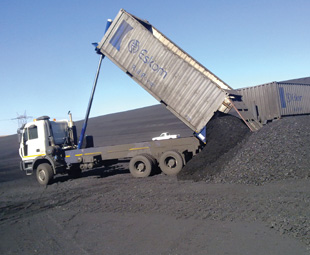Transporting the future

Specialised vehicles are manufactured to be exactly that – specialised. JACO DE KLERK takes a look at Makoya’s “specialised” operations and what its vehicles are used for.
In an ever-changing market and industry, operators are devising new ways to get specific jobs done – quicker and more efficiently. One such company is Makoya Supply Chain Holdings (Makoya), which became involved in the Eskom Majuba rail project challenge. Following the countrywide blackouts in 2009, coal-supply operations were quickened to the point where 60-wagon trains are loaded in less than two hours.
That achievement led to a sustainable weekly increase from 26 to 42 trains without adding any additional resources – reducing Eskom’s truck activity by 15 000 loads over a six-month period. Eskom then awarded Makoya a contract for handling coal transport at the Camden Coal Terminal (CCT). Through this new venture, Makoya would ultimately manage the supply of
300 000 tons of coal per month to Camden using a combination of trucks and trains, resulting in a further reduction of 400 truck trips on public roads each day.
That was achieved by using a revolutionary way to transport coal. “This is a brand new concept; it’s a first for South Africa – possibly worldwide – that people started moving coal in containers,” says Makoya’s chief executive officer Kenny Malgas.
Using front-end loaders, Makoya dumps coal into 100 containers on 50 Transnet Freight Rail wagons at the Blinkpan coal terminal. The train then hauls those (in two rakes of 25) to the CCT, where the containers are offloaded with “Reach Stackers” on to Makoya’s specialised “Haul Train” – an Astra rigid truck fitted with a tri-axle tipping skeletal trailer. The containers are then moved 4,7 km via private roads and tipped at the stockyard. This unique solution allows the transportation of two containers per trip and increases efficiency by 90 percent. This process is repeated continuously 24/7.
Even though the handling may seem straightforward it requires extremely specialised equipment. The containers used are exceptionally robust, with a carrying capacity of 30 ton/unit. “Initially the project required two reach stackers, but due to the intensity of the operations we have six,” says Malgas. “The original stackers required a 30-ton lifting capacity, but we soon realised that the normal specifications couldn’t do the job. So we bought two ‘Super Stackers’ that can both reach and lift the second row of containers. Our trailers were also specifically designed for this project, basically in the form of a skeletal, which is kitted with a robust tipping cylinder – revolutionising the offloading of coal through tipping while leaving the container on the truck.”
That gave Makoya the ability to offload one train every second day and then one train a day. As the project grew it was able to start moving two trains, progressing to three trains, each day. “Our aim is to offload four trains a day at Camden. Thus it’s important we own a reliable fleet of vehicles.”
That record growth proved to the financial institutions that Makoya could get the job done, which opened new financial lanes for the company. “We bought an Astra 6×6 and 6×4 the first time we got finance. They proved to be the most reliable vehicles we have. It’s true Astra is an expensive brand, but it’s guaranteed value for money – they’re the ones I don’t hear any complaints about. The trucks are also so rugged they can even pull two skeletals with containers on them, doing the job twice as fast,” says Malgas.
Astra also provides additional services at night and over weekends. “They’re pretty much on the ball, specifically at weekends, seeing as we’ve got a 24/7 operation and need that support all the time. We have our own mechanics looking after the trucks, but sometimes certain repairs need to be done by the manufacturer.” Makoya aims to convert its entire fleet into Astra 8x4s… indicating that both Makoya and Astra will grow together in this unique operation.
Published by
Focus on Transport
focusmagsa


